
Virtual Programming from the Library - Week of 4/20/20
April 15, 2020
Did you know that you can continue to stay connected to the Library while staying home? How would you like to participate in a virtual storytime with your family or receive resume help all from the comfort of your couch? Join Charlotte Mecklenburg Library every week for a wide range of virtual programming for children, teens and adults. See a complete listing of this upcoming programming for the week of 4/20/2020 below. Click the corresponding links for more information and register for programs where applicable.
Learn more about online programming by clicking here
Monday 4/20
Family Storytime - 9:30 a.m. (Children's programming) LEARN MORE
Book a Librarian - Business Research – 11 a.m. (Adult programming) REGISTER
Mindful Monday -12 p.m. (Adult programming) REGISTER
Book a Librarian - My Next Step – 12 p.m. (Teen programming) REGISTER
Virtual Reading Buddies – 1 p.m. (Children's programming) REGISTER
Book a Librarian - My Next Step – 1 p.m. (Teen programming) REGISTER
Virtual Reading Buddies – 2 p.m. (Children's programming) REGISTER
Book a Librarian - My Next Step – 2 p.m. (Teen programming) REGISTER
Book a Librarian - Technology – 2 p.m. REGISTER
Book a Librarian - General Reference – 2:30 p.m. REGISTER
Online Listen and Move Storytime – 3 p.m. (Children's programming) LEARN MORE
Strange New Worlds Book Club – 7 p.m. (Adult programming) REGISTER
Tuesday 4/21
Family Storytime – 9:30 a.m. (Children's programming) LEARN MORE
Aprendiendo Juntos en Casa – 10 a.m. (information to be emailed to prior participants)
The Detection Club Book Club – 10 a.m. (Adult programming) REGISTER
Cuentos Virtuales en Español - 10:30 a.m. (Children's programming) LEARN MORE
Book a Librarian - Business Research – 11 a.m. (Adult programming) REGISTER
Learning Circle: The Science of Well-Being – 11 a.m. (Adult programming) REGISTER
Career Development Intensive Coaching – 12 p.m. (Adult programming) LEARN MORE
Book a Librarian - My Next Step – 12 p.m. (Teen programming) REGISTER
Creating Virtual Resumes with the Job Help Center – 1 p.m. (Teen and Adult programming) REGISTER
Virtual Reading Buddies – 1 p.m. (Children's programming) REGISTER
Virtual Reading Buddies – 2 p.m. (Children's programming) REGISTER
Book a Librarian - Technology – 2 p.m. REGISTER
Book a Librarian - My Next Step – 2 p.m. (Teen programming) REGISTER
Book a Librarian - General Reference – 2:30 p.m. REGISTER
Book a Librarian - Children's Reference – 3 p.m. REGISTER
Book a Librarian - Children's Reference – 3:30 p.m. REGISTER
WFAE Presents: Podcasting 101 – 6:30 p.m. (Adult programming) REGISTER
Wednesday 4/22
Family Storytime – 9:30 a.m. (Children's programming) LEARN MORE
Book a Librarian - Business Research – 11 a.m. (Adult programming) REGISTER
History and Historical Fiction Book Club – 12 p.m. (Adult programming) REGISTER
Book a Librarian - My Next Step – 12 p.m. (Teen programming) REGISTER
Poetry in Pajamas – 12 p.m. (Adult programming) REGISTER
Virtual Reading Buddies – 1 p.m. (Children's programming) REGISTER
Book a Librarian - My Next Step – 1 p.m. (Teen programming) REGISTER
Learning Circle: Intro to HTML and CSS – 1 p.m. (Adult programming) LEARN MORE
Pocket-Size Book Club – 1 p.m. (Adult programming) REGISTER
Virtual Reading Buddies – 2 p.m. (Children's programming) REGISTER
Book a Librarian - Technology – 2 p.m. REGISTER
Book a Librarian - My Next Step – 2 p.m. (Teen programming) REGISTER
Book a Librarian - General Reference – 2:30 p.m. REGISTER
Active Reading Basics: Learn How to Help Your Child at Home – 3 p.m. (Adult programming) REGISTER
Online Listen and Move Storytime – 3 p.m. (Children's programming) LEARN MORE
Thursday 4/23
Family Storytime – 9:30 a.m. (Children's programming) LEARN MORE
Write Like You Mean It – 10 a.m. (Adult programming) LEARN MORE
Aprendiendo Juntos en Casa – 10 a.m. (information to be emailed to prior participants)
Cuentos Virtuales en Español - 10:30 a.m. (Children's programming) LEARN MORE
Book a Librarian - Business Research – 11 a.m. (Adult programming) REGISTER
e-Resource Highlight: Learn to Work from Home (Lynda) – 11 a.m. (Adult programming) LEARN MORE
Career Development Intensive Coaching – 12 p.m. (Adult programming) LEARN MORE
Book a Librarian - My Next Step – 12 p.m. (Teen programming) REGISTER
Virtual Reading Buddies – 1 p.m. (Children's programming) REGISTER
Creating Virtual Resumes with the Job Help Center – 1 p.m. (Adult and Teen programming) REGISTER
Book a Librarian - My Next Step – 1 p.m. (Teen programming) REGISTER
Active Reading Mentor Training – 2 p.m. (Adult programming) REGISTER
Virtual Reading Buddies – 2 p.m. (Children's programming) REGISTER
Book a Librarian - Technology – 2 p.m. REGISTER
Book a Librarian - My Next Step – 2 p.m. (Teen programming) REGISTER
Book a Librarian - General Reference – 2:30 p.m. REGISTER
Book a Librarian - Children's Reference – 3 p.m. REGISTER
Book a Librarian - Children's Reference – 3:30 p.m. REGISTER
Books on Tap Book Club – 7 p.m. (Adult programming) REGISTER
Friday 4/24
Family Storytime – 9:30 a.m. (Children's programming) LEARN MORE
Book a Librarian - Business Research – 11 a.m. (Adult programming) REGISTER
Book a Librarian - My Next Step – 12 p.m. (Teen programming) REGISTER
Virtual Reading Buddies – 1 p.m. (Children's programming) REGISTER
Book a Librarian - My Next Step – 1 p.m. (Teen programming) REGISTER
Book a Librarian - My Next Step – 2 p.m. (Teen programming) REGISTER
Virtual Reading Buddies – 2 p.m. (Children's programming) REGISTER
Book a Librarian - Technology – 2 p.m. REGISTER
Book a Librarian - General Reference – 2:30 p.m. REGISTER
Saturday 4/25
Family Storytime – 9:30 a.m. (Children's programming) LEARN MORE

Now streaming: Top 5 movies on hoopla by Library customers
April 15, 2020
Since we’re all home a lot more these days, movies are a great way to unwind and escape to another world. In addition to great e-books and e-audiobooks, hoopla has a great selection of movies. All you need to join in the fun is your Charlotte Mecklenburg Library card or One Access ID!
Learn more about hoopla and checkout limits here. Need a library card? Sign up here.
Here are the top five that Charlotte Mecklenburg Library customers have been streaming through hoopla digital:
1. The Pigeon Finds a Hot Dog (2010) - The popular children’s book is turned into a short movie. When Pigeon finds a delicious hot dog, he can't wait to devour it. But then along comes a sly duckling who wants a bite. Who will be the more clever bird? Run time: 7 minutes
2. Emma (1996) - Emma is a mischievous beauty who sets up her single friends. But-- she's not very good at it, and makes a hilariously tangled mess of everyone's lives, until she herself falls in love, finally freeing everyone from her outrageously misguided matchmaking! Rated PG. Run time: 121 minutes
3. Dragons Love Tacos (2014) - Dragons love tacos. They love chicken tacos, beef tacos, great big tacos, and teeny tiny tacos. So, if you want to lure a bunch of dragons to your party, you should definitely serve tacos. Buckets and buckets of tacos. Unfortunately, where there are tacos, there is also salsa. And if a dragon accidentally eats spicy salsa...oh, boy. You're in red-hot trouble. Run time: 6 minutes
4. Daddy Day Care (2003) - Two fathers (Eddie Murphy, Jeff Garlin) join the ranks of the unemployed and are forced to take their sons out of the exclusive Chapman Academy and become stay-at-home fathers. With no job possibilities on the horizon, the two dads decide to open their own day care facility, "Daddy Day Care," which boasts some fairly unconventional and sidesplitting methods of tending the kids. As "Daddy Day Care" starts to catch on, it launches them into a hilarious competition with Chapman Academy's tough-as-nails director (Anjelica Huston) for the hearts and minds of the children. Rated PG. Run time: 92 minutes.
5. Color Out of Space (2020) - After a meteorite lands in the front yard of their farm, Nathan Gardner (Nicolas Cage) and his family find themselves battling a mutant extraterrestrial organism as it infects their minds and bodies, transforming their quiet rural life into a living nightmare. Unrated. Run time 110 minutes.
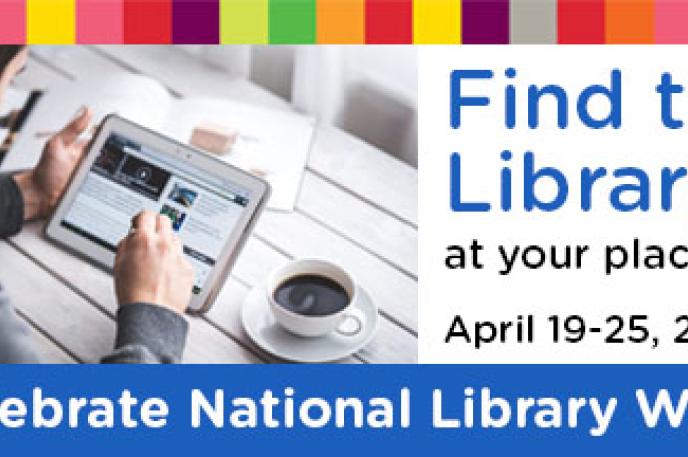
National Library Week 2020
April 15, 2020
Find the Library at Your Place: National Library Week, April 19-25, 2020
While Charlotte Mecklenburg Library has temporarily closed all locations to the public in the interest of community health and safety, we remain open for business online, providing virtual and online services and classes, along with extensive digital resources the Mecklenburg community needs now more than ever. The Library has been able to expand and increase access to digital content and have introduced innovative ways to continue our programming in a virtual and online capacity.
To highlight these efforts, we’re celebrating National Library Week April 19-25, 2020 with its theme “Find the Library at Your Place.” Charlotte Mecklenburg Library, our librarians and staff continue to provide a valuable role by never wavering from our mission to improve lives and build a stronger community.
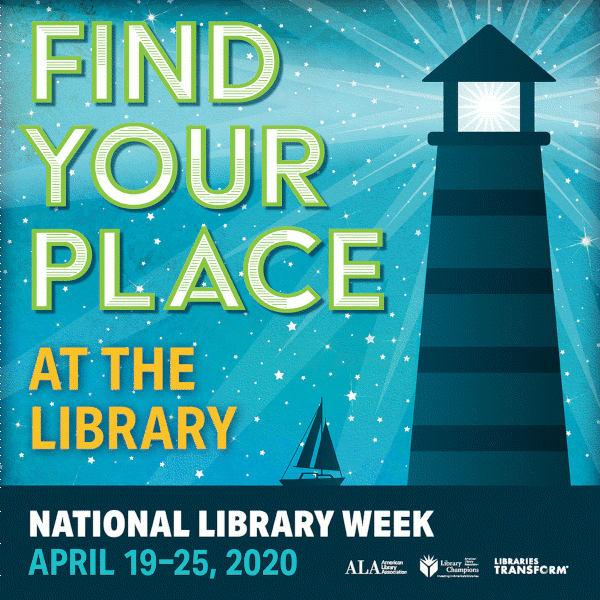 This year's theme truly aligns with our mission of improving lives and building a stronger community. It illustrates how today’s libraries are at the heart of our cities, towns, schools and campuses, providing critical resources, programs and expertise as we move to online and virtual offerings. Libraries also normally provide a public space where all community members, regardless of age, culture or income level, can come together to connect and learn. National Library Week is an opportunity to highlight the changing role of public libraries in our society. Libraries are about more than just the services they offer; they are about the people they serve.
This year's theme truly aligns with our mission of improving lives and building a stronger community. It illustrates how today’s libraries are at the heart of our cities, towns, schools and campuses, providing critical resources, programs and expertise as we move to online and virtual offerings. Libraries also normally provide a public space where all community members, regardless of age, culture or income level, can come together to connect and learn. National Library Week is an opportunity to highlight the changing role of public libraries in our society. Libraries are about more than just the services they offer; they are about the people they serve.
Library programs are designed to encourage community members to meet and discuss civic issues, work together using new technologies like digital platforms, online books clubs, and business research databases. Library staff also partner with other civic and service organizations to actively engage the people they serve, always striving to make sure their community’s needs are being met.
Celebrate National Library Week by sharing your library story—how do you find the Library at your place?
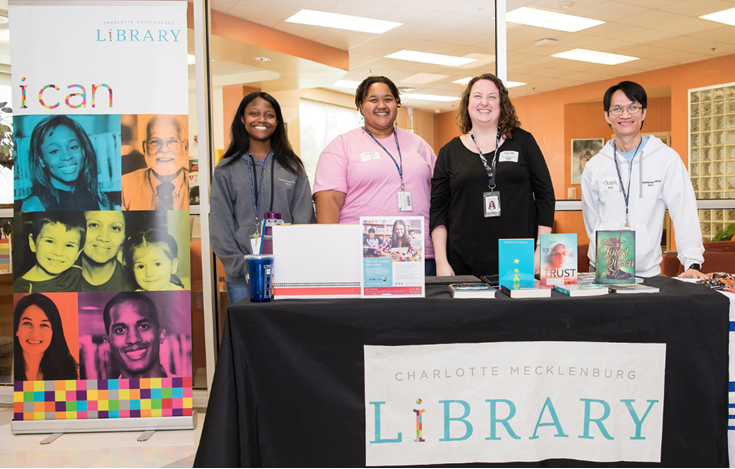 We invite our community to follow along, share and comment on social media at twitter.com/cmlibrary, facebook.com/cmlibrary and instagram.com/cmlibrary using the hashtags #NationalLibraryWeek and #CMLfindyourlibrary.
We invite our community to follow along, share and comment on social media at twitter.com/cmlibrary, facebook.com/cmlibrary and instagram.com/cmlibrary using the hashtags #NationalLibraryWeek and #CMLfindyourlibrary.
ShibSibs Serves as Honorary Chairs
National Library Week is an opportunity to highlight the changing role of public libraries in our society. Olympic medalists Maia and Alex Shibutani, a.k.a. the ShibSibs, are National Library Week Honorary Chairs and want everyone to know that they think libraries are amazing! Maia and Alex are two-time Olympic bronze medalists and three time-world medalist U.S. ice skaters and serve as the 2020 Honorary Chairs. KUDO KIDS: The Mystery of the Masked Medalist is the first in a middle-grade series that marks the writing debut of Maia and Alex Shibutani. The fun-filled, fast-paced mystery is inspired by the Shibutanis’ own familial bond and experiences traveling the world with Team USA. Available May 2020, the book captures the curiosity and life experiences that the ShibSibs share with their combined 1.4 million followers on social media channels and through their original YouTube videos.
Celebrations during National Library Week include:
- Monday, April 20: State of America's Libraries Report released, including Top Ten Frequently Challenged Books of 2019.
- Tuesday, April 21: National Library Workers Day, a day for library staff, administrators, and Friends groups to recognize the valuable contributions made by all library workers.
- Thursday, April 23: Library Giving Day is a one-day fundraising event with the goal of encouraging people who depend on and enjoy public libraries to donate to their individual library system. #LibraryGivingDay
- Thursday, April 23: Take Action for Libraries Day, a day to speak up for libraries and share your library story. #MyLibraryMyStory
We also invite you to support the Library - not only on April 22 but every day of the year - by donating to the Charlotte Mecklenburg Library Foundation.
“Find the Library at Your Place” is a national campaign sponsored by the American Library Association (ALA). National Library Week was first sponsored in 1958 and is an annual April observance by the ALA and libraries across the county.
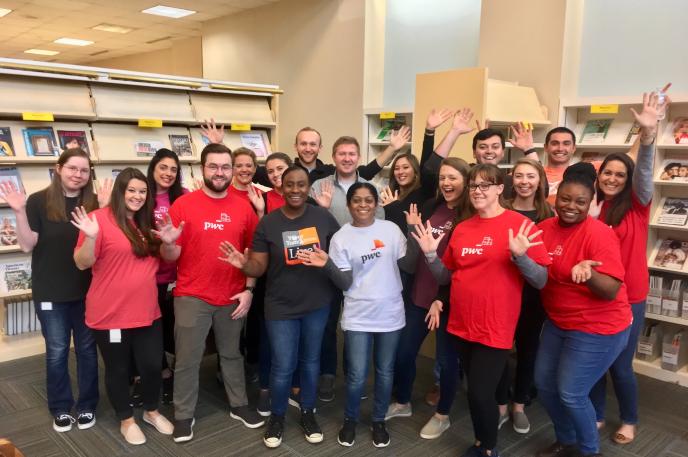
Charlotte Mecklenburg Library celebrates National Volunteer Week
April 16, 2020
Happy National Volunteer Week to the volunteers of Charlotte Mecklenburg Library!
We are grateful for every hand—and paw—that helps the Library fulfill our mission to improve lives and build a stronger community. Our volunteers are more than just book lovers and avid readers: they are ordinary people doing extraordinary things to create more connected, educated and literate neighborhoods and communities. This week-long national celebration highlights the enormous contributions that volunteers make every day as an integral part of Library operations.
Last year alone, 1,480 volunteers gave an impressive 54,605 hours to Library service – which is nearly 6,825 workdays! The Library thanks our volunteers for your dedication and support. We are honored to have you with us, bringing your exceptional energy and enthusiasm to the many roles you play at the Library as Reading Buddies, Technology Tutors, Circulation Helpers, Homework Helpers, our Paws to Read dogs and so much more.
Join the celebration
To celebrate, we will honor volunteers on our website and social media platforms during the week of April 19-25, 2020. Be sure to connect with the Library (@cmlibrary) on Facebook, Instagram, LinkedIn and Twitter to follow along.
Are you a proud Library volunteer? We would love to hear from you! Join in on the fun by posting to social media a photo of yourself and a caption explaining your reason for serving. Please tag @cmlibrary and use the hashtags #cmlibrary, #cmlibraryvolunteer and #nvw (National Volunteer Week) so that we can give you a proper shout out.
We look forward to highlighting our amazing volunteers this week and would love to start by introducing you to a few of our volunteers:
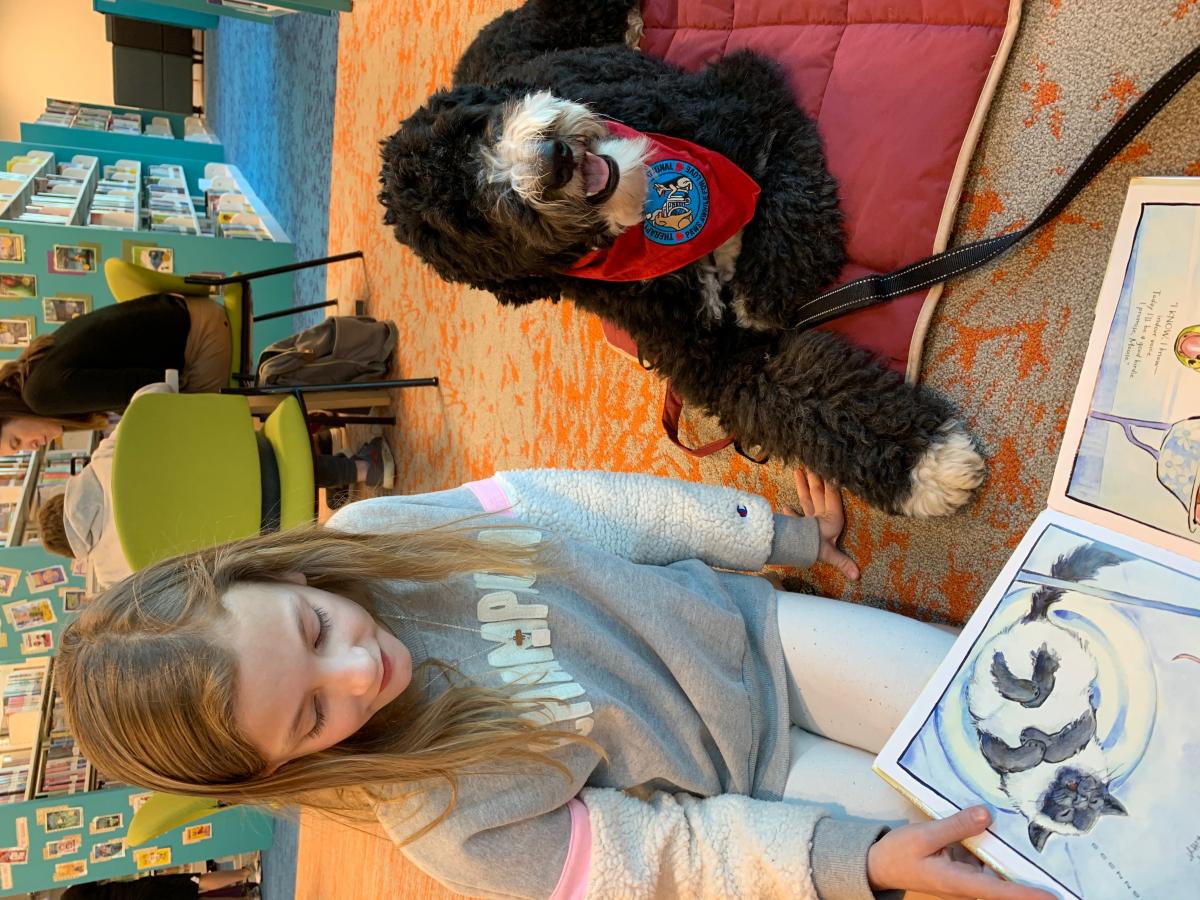 Jenn Kwiatkowski & Koda, Paws to Read
Jenn Kwiatkowski & Koda, Paws to Read
“Now that my kids are both in college, I found myself with a nurturing/maternal hole to fill and the time to do it. It was time to give back to my community. There is simply nothing more joyful than witnessing kids tackle words and stories in a setting that is specifically created to encourage readers of all levels. If children can't yet read, they can tell Koda a story based on what they see in the pictures or what they have in their minds. Koda doesn't care if the words or stories are correct, he's a nonjudgmental listener shamelessly waiting for a belly rub. Dogs have this unique way of changing the mood in a room. It's definitely less academic and more relaxed, which to me, is the perfect setting to tackle what can be for some, a challenge. Each story is typically rewarded with a high five and sometimes, if the Library isn't too busy, a few other tricks. I'm grateful to have the time for this program. Watching kids run off to pick just the right book to read to Koda, is good for the soul and the highlight of my week!”
 Mariana Morini, Job Help Center at Main Library
Mariana Morini, Job Help Center at Main Library
“At the library I have helped people using my computer skills, things that are extremely easy for me. I know that made a huge difference for the customers. I learned at the same time I was helping. The Job Help Center has a lot of materials to help people prepare for work. I distributed the resource materials and used them during my job searches too.
I’m from Brazil. When I arrived in Charlotte, I didn’t think my English was good, but in the Library I found the confidence to talk more and improve my listening skills. This volunteering enriched my life when it gave me friends, confidence to speak English, and the opportunity to serve my community being who I am. At the Library I feel I am important!”
 Matthew Wagner, South County Regional Library (in memoriam)
Matthew Wagner, South County Regional Library (in memoriam)
The Charlotte Mecklenburg Library would like to remember beloved South County Regional Library volunteer Matthew Wagner who passed away December 16, 2019.
Matthew, who was born with a rare illness that didn't stop from him from loving or living his life to the fullest, had a larger-than-life-personality and kind heart, making friends wherever he went. Along with volunteering at South County Regional, Matt loved the joy of holidays, music, making art, baking, being outdoors and spending time with family.
Matt will be deeply missed, and remembered as our friend forever.
Click the video below to watch a message for our volunteers.
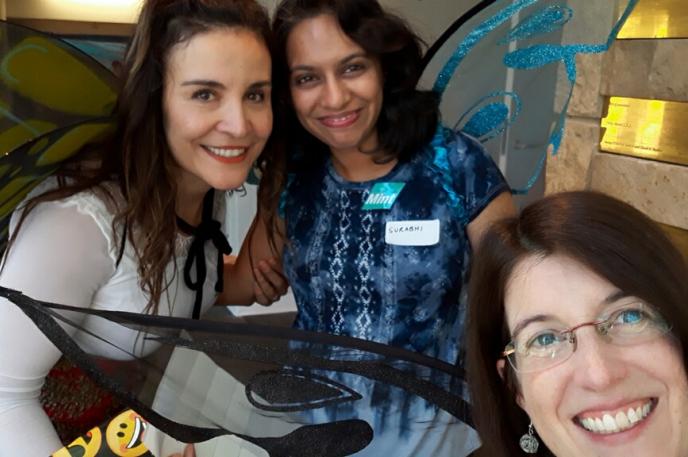
How Charlotte Mecklenburg Library helped me shine
April 17, 2020
Thursday mornings have been the best part of my week for more than four years now. The blank white paper invited me to write with a variety of pens to choose from, steaming hot coffee, snacks and, most importantly, my fellow writers. Pam Turner, the heart and soul of this group called Write Like You Mean It, works at Main Library, and this is where my association with the Library began.
In the year 2016, I moved to Charlotte. I had been in the United States just over eleven months. The people, the culture, the accents, everything felt as fresh as the smell of earth after the first rain of the season. I was trying to fit in and find a community that fits me. Given my professional writing background, it was no surprise that the Library was one of the first places on my list to visit.
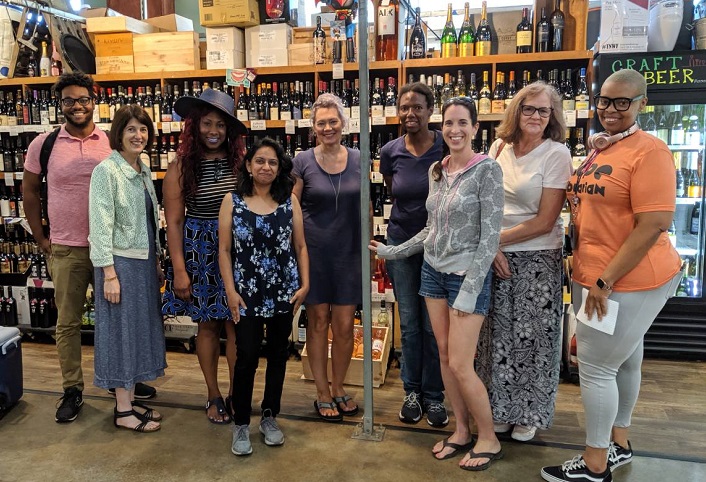 At the library, my eyes darted to the flyer about the weekly writing group, Write Like You Mean It.
At the library, my eyes darted to the flyer about the weekly writing group, Write Like You Mean It.
Initially, I felt a mix of excitement and apprehension. Luckily, my first experience at the group put my fears to rest. I felt welcome, comfortable and felt no pressure to share my writing. Soon, I moved ahead from merely listening to the fabulous words of other writers and grew brave enough to share my words, which earned me positive feedback that encouraged me to write more.
Enthused and motivated, I offered to volunteer for the group. This meant weekly meetings where Pam and I would discuss ideas about what prompts to use. My zeal to get creative and think out of the box doubled when Pam was supportive of my ideas and was willing to experiment with field trips and inviting guest speakers to the group. We take field trips to First Ward Park, art exhibits at Spirit Square, ride the streetcar to attend the Sensoria Festival at Central Piedmont Community College (CPCC) and always return with tons of material to write about.
As my confidence grew, I became a self-appointed ambassador for Library writing programs.
I attended writing groups in other Library locations to compare notes and promote my own group. Clearly, the word spread because soon the number of participants in the group grew considerably. I participated in local writing groups outside of the Library and, when I met other writers who struck a chord with me, I invited them to be guest speakers at the Library. I started my own fiction writing group, a monthly group where I shared tips, techniques and videos with information that continued to benefit me as a writer. I am now on the Library’s presenter showcase, which I am proud to be a part of.
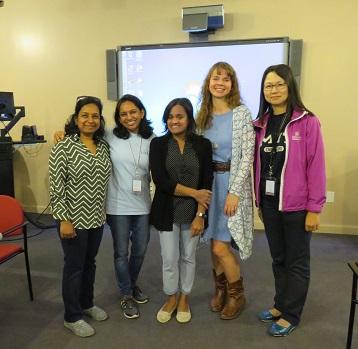 As a fresh off the boat immigrant, one of the challenges I faced was making good friends. Thanks to my writing group and my involvement in Library writing programs, I met many like-minded people. I now have a diverse and trustworthy group of friends, most of whom are writers. They have inspired me through their writing and supported me at my programs. I would love to mention all their names, but I am afraid I might forget someone. That gives you an idea of the number!
As a fresh off the boat immigrant, one of the challenges I faced was making good friends. Thanks to my writing group and my involvement in Library writing programs, I met many like-minded people. I now have a diverse and trustworthy group of friends, most of whom are writers. They have inspired me through their writing and supported me at my programs. I would love to mention all their names, but I am afraid I might forget someone. That gives you an idea of the number!
I would, however, like to mention two of my super special friends: Fandy, who also volunteered at Main library, and my writing buddy Vidya Murlidhar. These beautiful friendships have added joy to mundane days and have pulled me right back up in challenging times in my writing journey.
My current visa status does not allow me to work in the U.S., but I can certainly volunteer. I am grateful for the opportunity to do something important and meaningful to the community. Today, I am a better writer and in a position to enable others to do so. I am able to bridge resources and talent and contribute to building a welcoming and safe writing community. Special thanks to Becca Worthington, who works at ImaginOn's Spangler Library, for her infectious enthusiasm that motivates me to explore different types of writing, the entire staff ofthe Job Help Center at Main Library, Pam Turner, De’Trice Fox, Chantez Neymoss and Christine Bretz, who have been a pillar of strength in all my writing endeavors.
My heartfelt thanks to the Library for giving me a chance to shine by showcasing my talent and be a shining light for many others in the writing community.
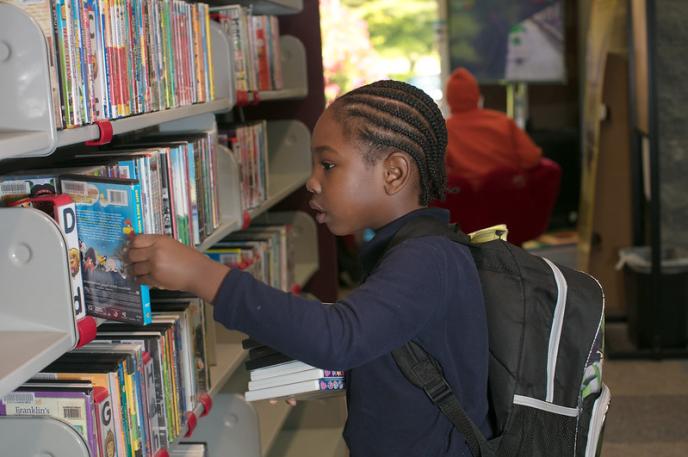
For the Love of Libraries
April 20, 2020
Since National Library Week runs from April 19 through April 25, now is a fitting time to celebrate the many ways the Charlotte Mecklenburg Library contributes to Charlotte’s community of readers and writers. Even though library branches are closed because of the coronavirus outbreak, our public library is still providing online support to area readers and writers, and the library is still participating in National Library Week.
Whenever I talk with Charlotte writers about the public library, they have stories to tell. I will focus on three whose connections with the Charlotte Mecklenburg Library have especially deep roots. One is Jeffrey Leak, whose books include Racial Myths and Masculinity in African American Literature and Visible Man: The Life of Henry Dumas. Another is my wife, Nancy Northcott. Her fiction includes The Herald of Day, the first novel in a historical fantasy trilogy, and a novella in Welcome to Outcast Station, the first in a science fiction series. Both Jeffrey and Nancy grew up in the Charlotte area, and their library connections go back to their childhoods. The third is community historian Thomas Hanchett, whose books include Sorting Out the New South City: Race, Class and Urban Development in Charlotte, 1875-1975 and Charlotte and the Carolina Piedmont. I asked each author to send me a paragraph about their experiences with our Charlotte Mecklenburg Library.
From Jeffrey Leak:
“I have a long-standing appreciation for the public library. I grew up near what is now Northwest School of the Arts, riding my bike in the summer to the library, then on LaSalle Street, now on Beatties Ford Road. My journeys there were the result of an ultimatum from my mama: ‘if you come in my house one more time, you’ll be in till this evening.’ Tired of me running in and out, Hattie Leak told me to make up my mind. Inside or outside. Heat or AC. More times than not, I chose the former. The librarians understood my dilemma, sometimes even including me on their lunch-run to Hoyles or Mr. C’s, less than a block away. But the main thing they gave me was access to books and the encouragement to read them. African American history and culture came alive in that welcoming space. From reading there, I always wanted to travel to the northeast where figures like Benjamin E. Mays and Zora Neale Hurston had gone. These black librarians took my curiosity and interests and, like the story of Jesus and the feeding of the fish to the multitudes, multiplied them. I don’t have any data to support this claim, but I think my reading skills actually improved in those pre-teen summers. What I do know is that my education has taken me to points in the northeast, including Maine and New York City (the respective places associated with Mays and Hurston), Africa, Europe and the Caribbean. Oh the places I have been! But I’ll always know that much of what I have been blessed to experience started at the library on LaSalle.
From Nancy Northcott:
As a geek child, I didn’t fit in with my more athletic, outdoorsy neighbors. I found a haven in the Davidson Public Library. I loved to ride my bike down to Main Street, check out as many books as the bike’s basket would hold, and pedal home to start reading. Mrs. Wally, the librarian, often had recommendations ready when I walked in the door. She knew I loved science fiction, history, historical fiction, mysteries, and YA romance, and her suggestions ran the gamut. I reveled in the imaginary journeys those books provided. The library was also special to me because my father and I often went there together. Those trips were the one activity only the two of us shared. Every couple of weeks, after supper, he would ask if I wanted to go. I always jumped at the chance. You can bring home so many more books when you have a car! During those visits, I regularly read the comic strips in the back of Boys’ Life magazine. I wanted a subscription, but my mom nixed that on grounds of my not being a boy. When my dad and I went to the library, I always took the latest Boys’ Life off the shelf and read the comics in the back. He knew but never commented, so that also was just between us. I check out much less fiction than I once did, but I love having the library available for research materials. It’s probably fair to say I wouldn’t have become a writer if the library hadn’t stimulated my imagination all those years ago.
From Tom Hanchett:
When I’m researching the history of a community, the local public library is always my first stop. I’ve used history collections in dozens of cities nationwide and I can tell you for sure that the Robinson-Spangler Carolina Room is among the best in the U.S. Arriving in Charlotte back in 1981 to research older neighborhoods for the Historic Landmarks Commission, I went directly to the original Carolina Room. It was then a single room staffed by a single person, Mary Louise Phillips. I wasn’t sure what she would make of this 26-year-old non-native, barely able to find Charlotte on a map, asking so many questions about Myers Park, Biddleville, cotton mills, land development. But she welcomed me in. The Carolina Room has been a home-base ever since. Today I’m delighted to be finishing my term as the Carolina Room’s first Historian-in-Residence, thanks to the vision of Library CEO Lee Keesler. In partnership with fellow community historian J. Michael Moore, we’ve just debuted a how-to website of tools, tips and weblinks for researching your house or neighborhood in Charlotte CharlotteHistoryToolkit.com. More work I’ve done over the years, drawing on the Carolina Room, can be found at my website www.HistorySouth.org. And while you’re on the internet, check out the Carolina Room’s own rich website, www.CMstory.org.
As Jeffrey, Nancy, and Tom reveal, the Charlotte Mecklenburg Library has played a significant role in these writers’ lives. In a sense, the public library can be seen as a recurring character that plays a variety of roles in the individual stories of Charlotte’s readers and writers and a central character in the overarching narrative of Storied Charlotte.
Mark I. West is a professor of English at UNC Charlotte, where he has taught since 1984. He regularly teaches courses on children’s and young adult literature. He has written or edited 16 books, the most recent of which is Shapers of American Childhood, which he co-edited with Kathy Merlock Jackson. His articles have appeared in various national publications including The New York Times Book Review, Publishers Weekly, Americana, and British Heritage, as well as many academic journals. Before entering academia, he worked as an early childhood educator and professional puppeteer. This post originally appeared on Mark’s blog, Storied Charlotte, and is reprinted here lightly edited and with his permission.
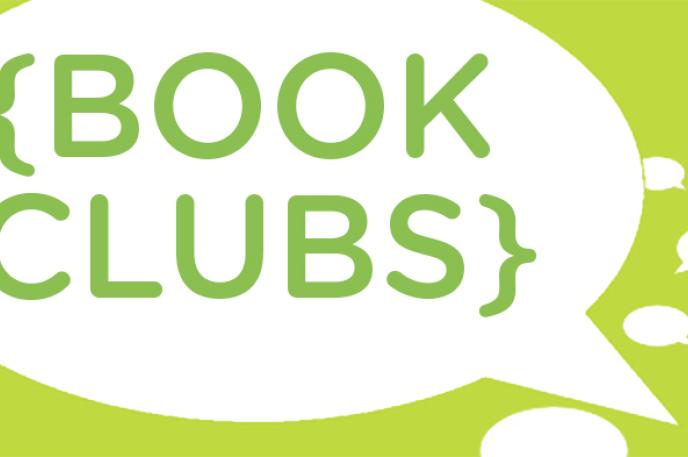
Stay connected with an online book club
April 20, 2020
Book clubs are a long-standing favorite program in public libraries across the country. Avid readers look forward to gathering each month to not only discuss a book, author or article, but to make connections, form new friendships and expand their minds. So, what do you do when you're social distancing and your book club can’t meet in person? Go virtual! Charlotte Mecklenburg Library staff miss seeing you, so our book clubs are moving online to help you stay connected and share your love of reading with others.
How do you find a topic? First, determine what it is you like. Do you enjoy graphic novels? We have a book club for you. If you are thrilled by mysteries or historical fiction, we have you covered. You might prefer to discuss contemporary fiction, explore international authors or maybe you have a desire for the Poldark series.
Book clubs are offered every week at different times of the day, so you can find one that works for your stay-at-home schedule.
 How Does It Work?
How Does It Work?
Register online for the book club you want to join. Be sure to include a valid email address. Library staff will email instructions with a link to join shortly before the program is scheduled. Attendees will be muted at the beginning of the program to cut back on distracting background noises, but you can unmute yourself anytime during the discussion to join the conversation or use the chat feature to share your comments. You can also choose whether to disable your camera if you don’t want to be seen. Keep in mind some book clubs limit the number of registrants. This is to ensure everyone who attends has a quality experience.
Resources for book clubs
If you facilitate your own book club and may be looking for fresh ideas, the Library can help you with this too. NoveList, one of the Library’s many digital resources, provides reading recommendations for all ages and contains book club resources, including discussion guides, under its “Quick Links.” View the tutorial for help getting started. Library staff can also help with recommendations when you Book a Librarian for a 30-minute, one-on-one general reference session.
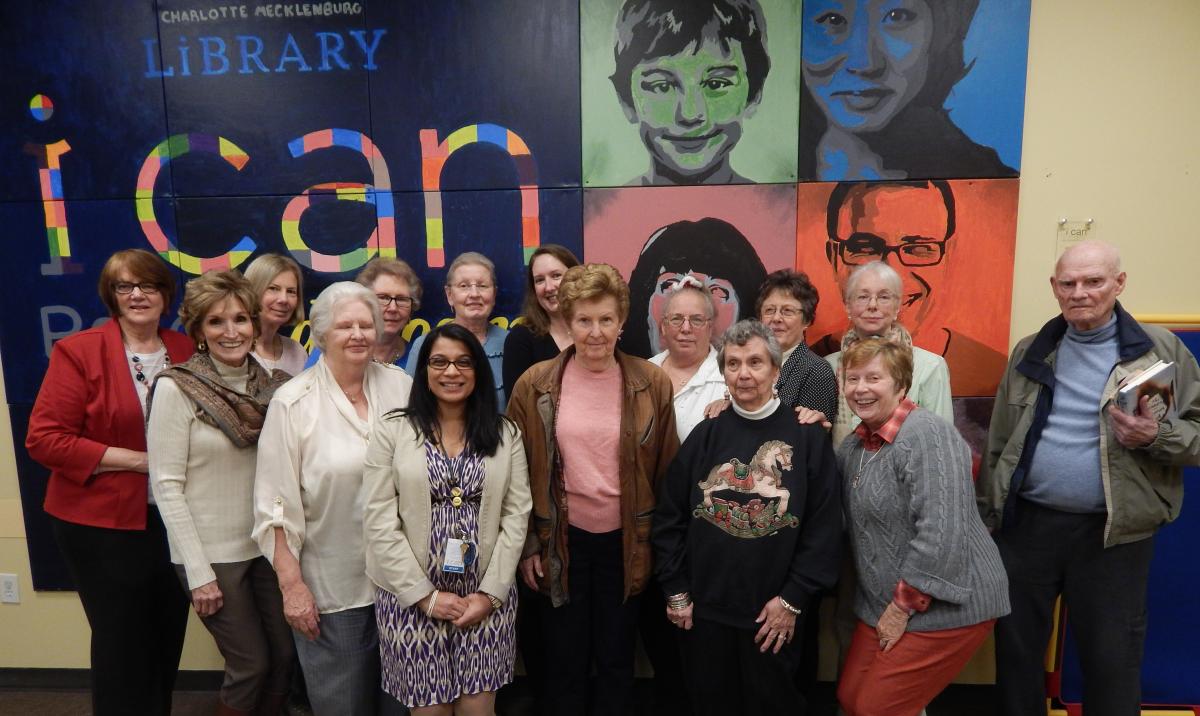 We know it’s challenging for many of you to facilitate your own book clubs without having access to the Library’s extensive print collection. Luckily, we have options for you through our e-book and e-audiobook platforms. hoopla currently offers 10 checkouts per month, plus a collection of “bonus borrows” that won’t count against your monthly limits – and there are no waits on this special collection. OverDrive’s “always available” collections of classics, Indie authors and other featured titles also don’t count against your OverDrive checkout limits. BiblioBoard Library offers unlimited access to its collection of North Carolina publishers and self-published authors. A library card or ONE Access ID is all you need to access any of our digital resources. If you don’t have a library card, apply online.
We know it’s challenging for many of you to facilitate your own book clubs without having access to the Library’s extensive print collection. Luckily, we have options for you through our e-book and e-audiobook platforms. hoopla currently offers 10 checkouts per month, plus a collection of “bonus borrows” that won’t count against your monthly limits – and there are no waits on this special collection. OverDrive’s “always available” collections of classics, Indie authors and other featured titles also don’t count against your OverDrive checkout limits. BiblioBoard Library offers unlimited access to its collection of North Carolina publishers and self-published authors. A library card or ONE Access ID is all you need to access any of our digital resources. If you don’t have a library card, apply online.
Visit the Library’s calendar of events for a full listing of our virtual programs. We can’t wait to see you!

Virtual Programming from the Library - Week of 4/27/20
April 22, 2020
Did you know that you can continue to stay connected to the Library while staying home? How would you like to participate in a virtual storytime with your family or receive resume help all from the comfort of your couch? Join Charlotte Mecklenburg Library every week for a wide range of virtual programming for children, teens and adults. See a complete listing of this upcoming programming for the week of 4/27/2020 below. Click the corresponding links for more information and register for programs where applicable.
Learn more about online programming by clicking here
Sunday 4/26
International Authors Book Club for 20-30 Somethings (Virtual) - 4 p.m. LEARN MORE
Monday 4/27
Family Storytime - 9:30 a.m. (Children's programming) LEARN MORE
One-on-One Homework Help - 10 a.m. (Children's programming) REGISTER
Online Listen and Move Storytime – 10:30 a.m. (Children's programming) LEARN MORE
Book a Librarian - Business Research – 11 a.m. (Adult programming) REGISTER
One-on-One Homework Help - 11 a.m. (Children's programming) REGISTER
Mindful Monday -12 p.m. (Adult programming) REGISTER
Book a Librarian - My Next Step – 12 p.m. (Teen programming) REGISTER
Virtual Reading Buddies – 1 p.m. (Children's programming) REGISTER
Book a Librarian - My Next Step – 1 p.m. (Teen programming) REGISTER
Virtual Reading Buddies – 2 p.m. (Children's programming) REGISTER
Book a Librarian - My Next Step – 2 p.m. (Teen programming) REGISTER
Book a Librarian - Technology – 2 p.m. REGISTER
Book a Librarian - General Reference – 2:30 p.m. REGISTER
Traditional Storytelling– 3 p.m. (Children's programming) LEARN MORE
Tuesday 4/28
Family Storytime – 9:30 a.m. (Children's programming) LEARN MORE
Aprendiendo Juntos en Casa – 10 a.m. (information to be emailed to prior participants)
One-on-One Homework Help - 10 a.m. (Children's programming) REGISTER
Cuentos Virtuales en Español - 10:30 a.m. (Children's programming) LEARN MORE
Book a Librarian - Business Research – 11 a.m. (Adult programming) REGISTER
Learning Circle: The Science of Well-Being – 11 a.m. (Adult programming) REGISTER
One-on-One Homework Help - 11 a.m. (Children's programming) REGISTER
Career Development Intensive Coaching – 12 p.m. (Adult programming) LEARN MORE
Book a Librarian - My Next Step – 12 p.m. (Teen programming) REGISTER
Creating Virtual Resumes with the Job Help Center – 1 p.m. (Teen and Adult programming) REGISTER
Virtual Reading Buddies – 1 p.m. (Children's programming) REGISTER
Book a Librarian - My Next Step – 1 p.m. (Teen programming) REGISTER
Virtual Reading Buddies – 2 p.m. (Children's programming) REGISTER
Book a Librarian - Technology – 2 p.m. REGISTER
Book a Librarian - My Next Step – 2 p.m. (Teen programming) REGISTER
Book a Librarian - General Reference – 2:30 p.m. REGISTER
Book a Librarian - Children's Reference – 3 p.m. REGISTER
Book a Librarian - Children's Reference – 3:30 p.m. REGISTER
WFAE Presents: Podcasting 101 – 6:30 p.m. (Adult programming) REGISTER
Wednesday 4/29
Family Storytime – 9:30 a.m. (Children's programming) LEARN MORE
One-on-One Homework Help - 10 a.m. (Children's programming) REGISTER
The Personal Branding of You - 10 a.m. (Adult programming) LEARN MORE
Online Listen and Move Storytime – 10:30 a.m. (Children's programming) LEARN MORE
Book a Librarian - Business Research – 11 a.m. (Adult programming) REGISTER
One-on-One Homework Help - 11 a.m. (Children's programming) REGISTER
Book a Librarian - My Next Step – 12 p.m. (Teen programming) REGISTER
Virtual Reading Buddies – 1 p.m. (Children's programming) REGISTER
Book a Librarian - My Next Step – 1 p.m. (Teen programming) REGISTER
Learning Circle: Intro to HTML and CSS – 1 p.m. (Adult programming) LEARN MORE
Virtual Reading Buddies – 2 p.m. (Children's programming) REGISTER
Book a Librarian - Technology – 2 p.m. REGISTER
Book a Librarian - My Next Step – 2 p.m. (Teen programming) REGISTER
Book a Librarian - General Reference – 2:30 p.m. REGISTER
Active Reading Basics: Learn How to Help Your Child at Home – 3 p.m. (Adult programming) REGISTER
Engage 2020: School Age Stories – 3 p.m. (Children's programming) LEARN MORE
Thursday 4/30
Family Storytime – 9:30 a.m. (Children's programming) LEARN MORE
Write Like You Mean It – 10 a.m. (Adult programming) LEARN MORE
Aprendiendo Juntos en Casa – 10 a.m. (information to be emailed to prior participants)
One-on-One Homework Help - 10 a.m. (Children's programming) REGISTER
Cuentos Virtuales en Español - 10:30 a.m. (Children's programming) LEARN MORE
Book a Librarian - Business Research – 11 a.m. (Adult programming) REGISTER
One-on-One Homework Help - 11 a.m. (Children's programming) REGISTER
Career Development Intensive Coaching – 12 p.m. (Adult programming) LEARN MORE
Book a Librarian - My Next Step – 12 p.m. (Teen programming) REGISTER
Virtual Reading Buddies – 1 p.m. (Children's programming) REGISTER
Creating Virtual Resumes with the Job Help Center – 1 p.m. (Adult and Teen programming) REGISTER
Book a Librarian - My Next Step – 1 p.m. (Teen programming) REGISTER
Active Reading Mentor Training – 2 p.m. (Adult programming) REGISTER
Virtual Reading Buddies – 2 p.m. (Children's programming) REGISTER
Book a Librarian - Technology – 2 p.m. REGISTER
Book a Librarian - My Next Step – 2 p.m. (Teen programming) REGISTER
Book a Librarian - General Reference – 2:30 p.m. REGISTER
Book a Librarian - Children's Reference – 3 p.m. REGISTER
Tips for Virtual Interviews - 3 p.m. (Adult programming) REGISTER
Book Talk: Children's - 3 p.m. (Children's programming) LEARN MORE
Book a Librarian - Children's Reference – 3:30 p.m. REGISTER
Poldark Book Club - 6 p.m. (Adult programming) LEARN MORE
Books on Tap Book Club – 7 p.m. (Adult programming) REGISTER
Friday 5/1
Family Storytime – 9:30 a.m. (Children's programming) LEARN MORE
One-on-One Homework Help - 10 a.m. (Children's programming) REGISTER
Baby Storytime - 10:30 a.m. (Children's programming) LEARN MORE
Book a Librarian - Business Research – 11 a.m. (Adult programming) REGISTER
One-on-One Homework Help - 11 a.m. (Children's programming) REGISTER
Book a Librarian - My Next Step – 12 p.m. (Teen programming) REGISTER
Virtual Reading Buddies – 1 p.m. (Children's programming) REGISTER
Book a Librarian - My Next Step – 1 p.m. (Teen programming) REGISTER
Book a Librarian - My Next Step – 2 p.m. (Teen programming) REGISTER
Virtual Reading Buddies – 2 p.m. (Children's programming) REGISTER
Book a Librarian - Technology – 2 p.m. REGISTER
Book a Librarian - General Reference – 2:30 p.m. REGISTER
Saturday 5/2
Family Storytime – 9:30 a.m. (Children's programming) LEARN MORE
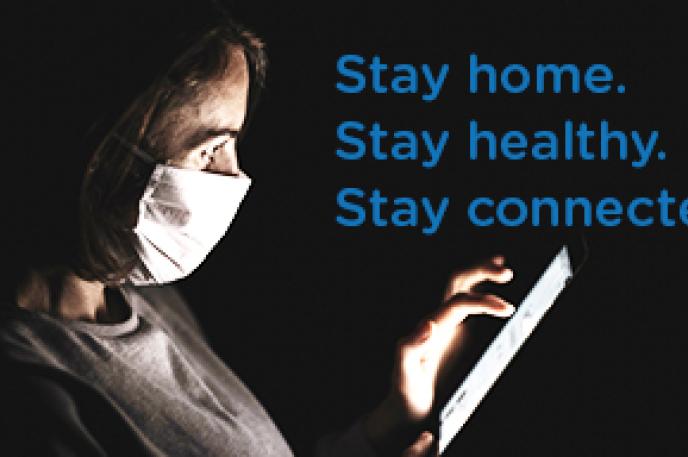
Mecklenburg County urges residents to stay home
April 23, 2020
The current COVID-19 or coronavirus pandemic has caused increased anxiety for many residents of Mecklenburg County. Mixed messages from the media paired with conspiracy theories and other misinformation have also made it hard for many to determine fact from fiction. For information on COVID-19, please click here.
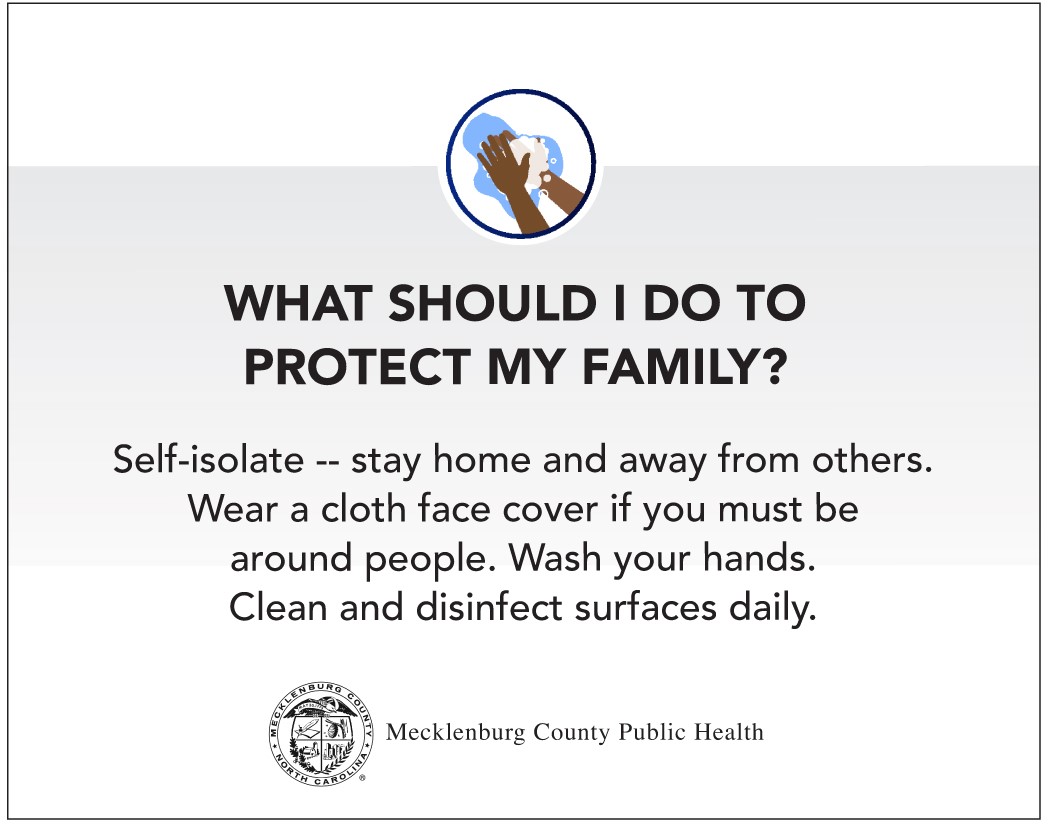 One message Mecklenburg County officials want to make clear is that Mecklenburg County is under a Stay at Home Order, which was extended to May 8, 2020 by North Carolina Governor Roy Cooper on Thursday, April 23, 2020. This order mandates that residents stay home unless they are considered essential workers or need to make essential trips to the doctor or hospital, to the pharmacy for medical needs, or to secure food and beverage items at grocery stores and local restaurants. Residents are also permitted to go outside to walk their pets, get exercise and a few other activities listed on this list of “Stay at Home Order Do’s and Don’ts.”
One message Mecklenburg County officials want to make clear is that Mecklenburg County is under a Stay at Home Order, which was extended to May 8, 2020 by North Carolina Governor Roy Cooper on Thursday, April 23, 2020. This order mandates that residents stay home unless they are considered essential workers or need to make essential trips to the doctor or hospital, to the pharmacy for medical needs, or to secure food and beverage items at grocery stores and local restaurants. Residents are also permitted to go outside to walk their pets, get exercise and a few other activities listed on this list of “Stay at Home Order Do’s and Don’ts.”
In addition to social distancing precautions, the county has plans to increase access to testing in vulnerable communities (e.g., mobile and pop-up testing), track and monitor data to better understand disparities and to spread key messages and up-to-date information.
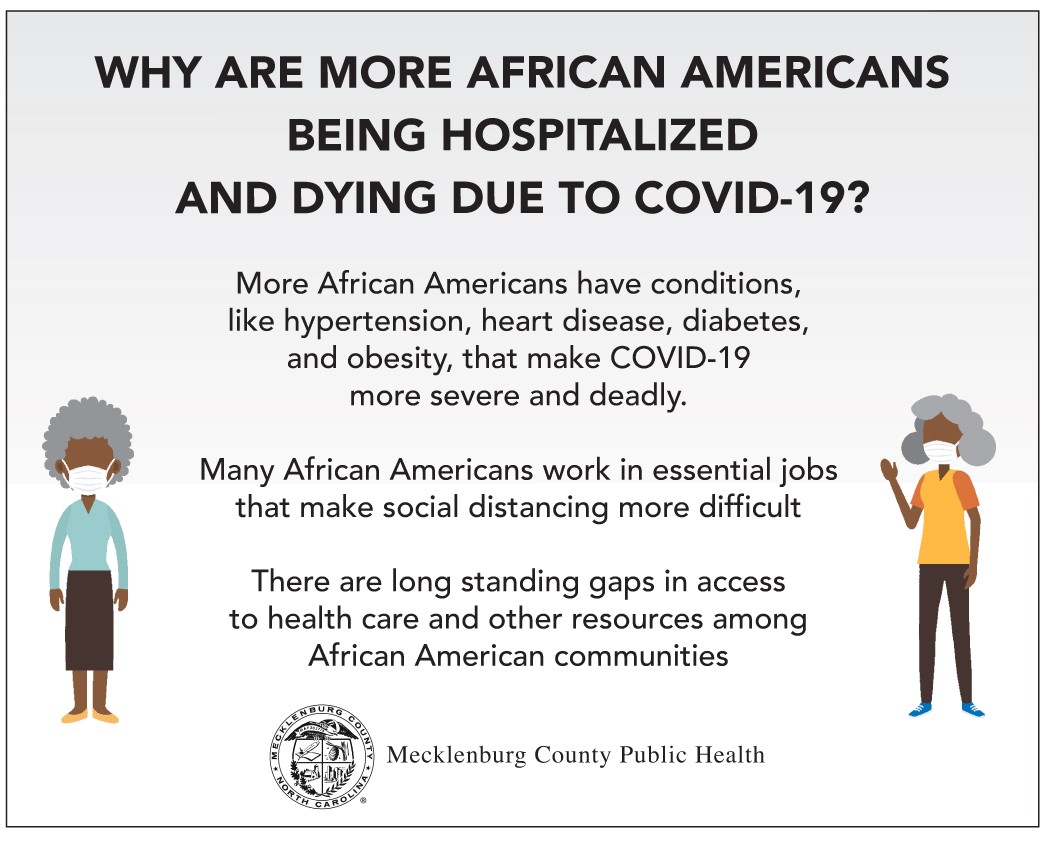 Mecklenburg County Deputy Health Director, Raynard Washington, also wants to clear up misconceptions regarding the populations most vulnerable for contracting COVID-19. It is important for residents to understand that everyone is at risk for contracting the virus. While there is no evidence suggesting genetic differences impact the spread of the disease, COVID-19 disproportionately affects the African American community due to greater employment in essential, customer-facing jobs, higher rates and earlier onset of underlying chronic health conditions and longstanding gaps in access to health care and other resources.
Mecklenburg County Deputy Health Director, Raynard Washington, also wants to clear up misconceptions regarding the populations most vulnerable for contracting COVID-19. It is important for residents to understand that everyone is at risk for contracting the virus. While there is no evidence suggesting genetic differences impact the spread of the disease, COVID-19 disproportionately affects the African American community due to greater employment in essential, customer-facing jobs, higher rates and earlier onset of underlying chronic health conditions and longstanding gaps in access to health care and other resources.
To learn more about COVID-19 from Mecklenburg County, please visit MeckNC.gov/COVID-19.
Below, you will find links to educational and informational tools you can use to raise awareness for yourself or others in your social network. To learn more about staying connected to Charlotte Mecklenburg Library digital and online resources, click here.
Mecklenburg County COVID-19 Resources:
- Stay at Home Order Do’s and Don’ts
- HELP! I am dealing with a person crisis
- What is social distancing?
- How can I stay connected while social distancing?
- Why are more African Americans being hospitalized or dying due to COVID-19?
- What should I do to protect my family?
- Should I wear a mask?
- Cutting stress during a pandemic
- What to do if you feel sick?
- Frequently Asked Questions (FAQs)
